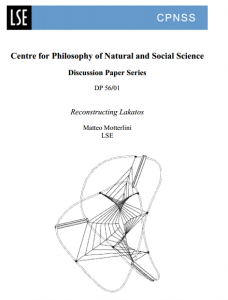Reconstructing Lakatos. A reassessment of Lakatos’ philosophical project and debates with Feyerband in light of the Lakatos Archive
Feyerabend had claimed that his friend and fellow was a “big bastard – a Pop-Hegelian philosopher born from a Popperian father and an Hegelian mother.” (“Lakatos-Feyerabend Correspondence”, in Motterlini, ed., 1999, pp. 184, 194). In fact, some of Lakatos’s most fruitful contributions – such as his dialectical conception of mathematical heuristic, the idea of rational reconstruction and, more generally, the emphasis on the role of criticism in the progress of knowledge – come directly from a peculiar philosophical conflation of Hegelian and Popperian ideas. In this paper, however, I shall argue that, for the same reason, a tension in Lakatos’s thought cannot be ultimately resolved. Like a seaman in the famous pirates’ ballad caught “between the devil and the deep blue sea”, that is between his captain who held neardictatorial powers on the one side, and the dangerous boundless forces of nature on the other, Lakatos too was caught between the devil of Hegelian historicism and the deep blue sea of Popperian fallibilism. This conclusion will be largely based on the material in the Archive of Professor Imre Lakatos at the British Library at the London School of Economics for Political and Economic Science (henceforth Archive). Instead of giving a complete description of the available material, I shall emphasise those items which illustrate most clearly Lakatos’s method of “Proofs and Refutations”, his revision of Popper’s falsificationist approach, the shift that occurred in the conception of methodology from his early writings to his later papers, his criticism of the neoauthoritarian philosophies such as Toulmin’s, and finally his struggle to defend “Reason” against Feyerabend’s neo-sceptical challenge.
Download articolo completo:



